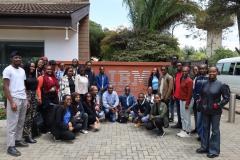School Of Science And Technology Launches Bachelor Of Science In Artificial Intelligence Robotics
By Leah Mutanu Mwaura
The School of Science and Technology is proud to announce the launch of its newest undergraduate program: Bachelor of Science in Artificial Intelligence (AI) & Robotics. This forward-looking degree is designed to prepare students for the dynamic world of intelligent systems, combining the power of machine learning, robotics engineering, and ethical governance. The program offers a rigorous foundation in computer science while integrating hands-on experience with autonomous systems, preparing graduates to lead innovation across industries.
What sets this program apart is its pioneering status and purpose-driven design. As the first undergraduate degree in Artificial Intelligence & Robotics in the region, it positions USIU-Africa at the forefront of tech education in East Africa. The curriculum is intentionally crafted to address Africa’s unique challenges and opportunities, ranging from agricultural automation and healthcare access to ethical AI governance and inclusive innovation. True to USIU-Africa’s mission of producing globally competitive graduates with a strong sense of social responsibility, the program blends technical rigor with human-centered design, policy awareness, and ethical reasoning. Students won’t just learn how to build intelligent systems, they’ll learn how to deploy them responsibly and sustainably. The program emphasizes the use of accessible, locally available technologies and open-source platforms, ensuring that innovations are both scalable and grounded in the realities of resource-constrained environments. Learners will engage with real-world problems, making this program a launchpad for transformative, locally grounded innovation.
Students enrolled in the program will graduate with a deep understanding of the principles and mechanisms that drive intelligent systems. They will learn to design and develop AI and robotics solutions that simulate natural intelligence and address real-world societal challenges, whether working independently or in collaborative teams. The curriculum emphasizes ethical leadership, equipping students to navigate the complex moral and governance issues surrounding intelligent technologies. Learners will also be trained to conduct rigorous research on current and emerging trends in AI and robotics, positioning them to contribute to innovation, policy, and academic discourse in this rapidly evolving field.
The career opportunities for graduates are vast and growing. From autonomous vehicle development and smart agriculture to AI policy consulting and robotics manufacturing, the demand for skilled professionals in this field is surging. This program responds directly to global and regional industry needs, equipping students to become AI engineers, robotics designers, machine learning specialists, and ethical technologists. As Kenya and Africa embrace digital transformation, USIU-Africa is positioning its graduates at the forefront of this revolution.
The program is strengthened by USIU-Africa’s investment in cutting-edge facilities and expert faculty. Students will train in labs, equipped with programmable robots, sensors, and simulation platforms. Faculty members bring deep expertise in artificial intelligence, embedded systems, and digital transformation, and students will benefit from partnerships with industry leaders, research institutes, and global universities. These collaborations ensure that learning is both current and connected to the real world.
Admission to the Bachelor of Science in Artificial Intelligence & Robotics is open to students who meet the minimum university entrance qualifications, Kenya Certificate of Secondary Education (KCSE) or its equivalent, with a minimum aggregate of C+ (Plus) and a minimum grade of C+ in Mathematics, and Physical Science or Physics. This program is designed for students who are intellectually curious, eager to explore how intelligent systems work, and passionate about applying technology to solve real-world problems. Whether drawn to robotics, machine learning, or the ethical dimensions of AI, ideal candidates are those who want to innovate with purpose and shape the future of intelligent technologies in Africa.


